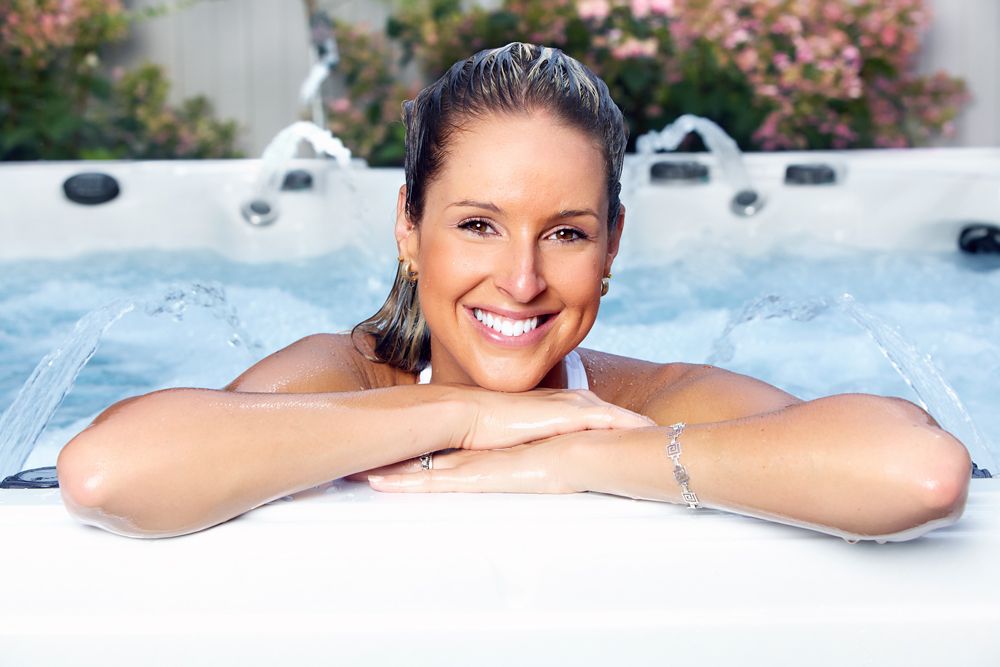SANITIZERS
AN EASY TO UNDERSTAND GUIDE
The single most important additive to your hot tub water is a sanitizer. It is imperative that a proper level of sanitizer be maintained to effectively disinfect your spa water to prevent illness or discomfort. A variety of spa sanitizers are available with the most common being bromine and chlorine. Following is a description of a few different types along with their respective advantages and disadvantages.
Bromine
Bromine is a member of the chemical family of halogens which includes chlorine. They kill bacteria by destroying the enzymes and structures inside the microorganism's cells, rendering them harmless. In our area of overnight cabin rentals, bromine is used nearly exclusively. It is relatively inexpensive to use and is easy to maintain in the proper level by using tablets in a floating dispenser. Unlike chlorine which has no further sanitizing capability once combined with waste, bromine can be reactivated with a non-chlorine spa shock. It has a less offensive odor and causes less drying out and itching of the skin than chlorine. Bromine is more pH stable but this also makes it more difficult to remove any residual odor from your skin. Bromine levels should be maintained in the 3.0 to 5.0 PPM range. To assure initial effectiveness, granular sodium bromide should be added at startup to establish an immediate bromine bank.
Advantages
Convenient to use/inexpensive
Readily available
No difference between the effectiveness of free versus combined bromine
Less odor than chlorine
Less skin irritation than Chlorine
Readily available
No difference between the effectiveness of free versus combined bromine
Less odor than chlorine
Less skin irritation than Chlorine
No difference between the effectiveness of free versus combined bromine
Less odor than chlorine
Less skin irritation than Chlorine
Less odor than chlorine
Less skin irritation than Chlorine
Less skin irritation than Chlorine
Disadvantages
Low pH (approx. 3.5 to 4.5)
Bromine odor more difficult to shower off
Requires the use of sodium bromide when water is changed to establish an immediate bromine reserve
Bromine odor more difficult to shower off
Requires the use of sodium bromide when water is changed to establish an immediate bromine reserve
Requires the use of sodium bromide when water is changed to establish an immediate bromine reserve
Chlorine
Chlorine is also a member of the chemical family of halogens. It is inexpensive, very effective and fairly easy to use. Chlorine has to be added to a hot tub frequently because it has no sanitizing ability once it combines with waste. Chlorine also has a strong smell that some bathers may find unpleasant and it has a tendency to dry out skin leading to itching and possibly rashes. Chlorine levels should be maintained in the 1.5 to 3.00 PPM range.
Advantages
More neutral pH - sodium di-chlor has a pH of 7.0
Readily available
Can be used as both a sanitizer and a shock
Inexpensive
Readily available
Can be used as both a sanitizer and a shock
Inexpensive
Can be used as both a sanitizer and a shock
Inexpensive
Inexpensive
Disadvantages
Less convenient - needs to be added manually several times a week
Confusing varieties - Numerous types of chlorine are available. Only sodium di-chlor should be used in hot tubs
No sanitizing ability after it combines with waste
Strong odor/skin irritation
Some tub manufacturer's may void warranty if used
Confusing varieties - Numerous types of chlorine are available. Only sodium di-chlor should be used in hot tubs
No sanitizing ability after it combines with waste
Strong odor/skin irritation
Some tub manufacturer's may void warranty if used
No sanitizing ability after it combines with waste
Strong odor/skin irritation
Some tub manufacturer's may void warranty if used
Strong odor/skin irritation
Some tub manufacturer's may void warranty if used
Some tub manufacturer's may void warranty if used
Mineral Purifiers
Natural mineral purifiers incorporate silver and copper to naturally destroy contaminants that create cloudy water. They work in conjunction with your chlorine spa sanitizer, reducing the amount needed by half or more (can be reduced to only 0.5 PPM). They do not function as a sanitizer by their selves. While they will save you money for sanitizer, they only last for about four months.
Advantages
Easy to use, fits inside filter
Lasts up to 4 months
Can be used with chlorine and ozone
No chemical smells
Lasts up to 4 months
Can be used with chlorine and ozone
No chemical smells
Can be used with chlorine and ozone
No chemical smells
No chemical smells
Disadvantages
Need to shock frequently with chlorine or non-chlorine spa shock
Only last 4 months
Some brands (Nature 2) cannot be used with bromine, biquanides or other products containing copper
Cost/difficulty finding product
Only last 4 months
Some brands (Nature 2) cannot be used with bromine, biquanides or other products containing copper
Cost/difficulty finding product
Some brands (Nature 2) cannot be used with bromine, biquanides or other products containing copper
Cost/difficulty finding product
Cost/difficulty finding product
Biquanides
Biquanides (chemical name: polyhexamethylene biquanide or PHMB) are sold under brand names such as Baquacil® and SoftSwim®. We do not stock any of these products because they are incompatible with other spa chemicals, are much more expensive than other sanitizers and usually require additional unique products such as special filter cleaners, etc. They also may attack some plastics such as polycarbonates.
Advantages
Easy to use, add once a week
No chemical smells
No bromine/chlorine skin reactions
No chemical smells
No bromine/chlorine skin reactions
No bromine/chlorine skin reactions
Disadvantages
Very expensive/hard to find
Can discolor or eat some plastics
Some tub manufacturer's may void warranty if used
Filter cleaning much more involved
Can discolor or eat some plastics
Some tub manufacturer's may void warranty if used
Filter cleaning much more involved
Some tub manufacturer's may void warranty if used
Filter cleaning much more involved
Filter cleaning much more involved

